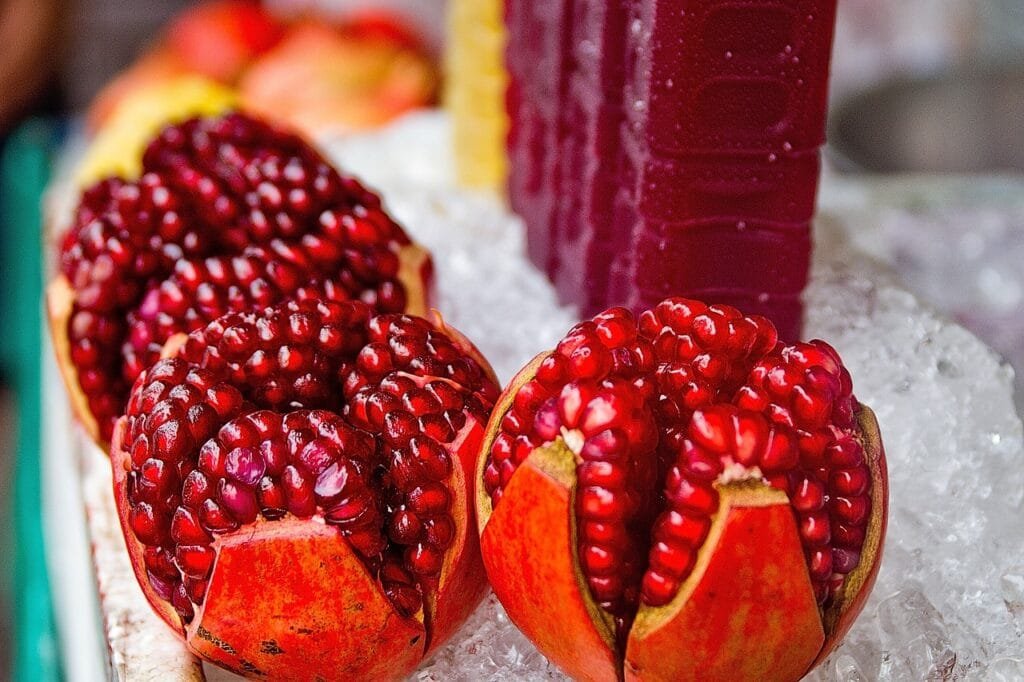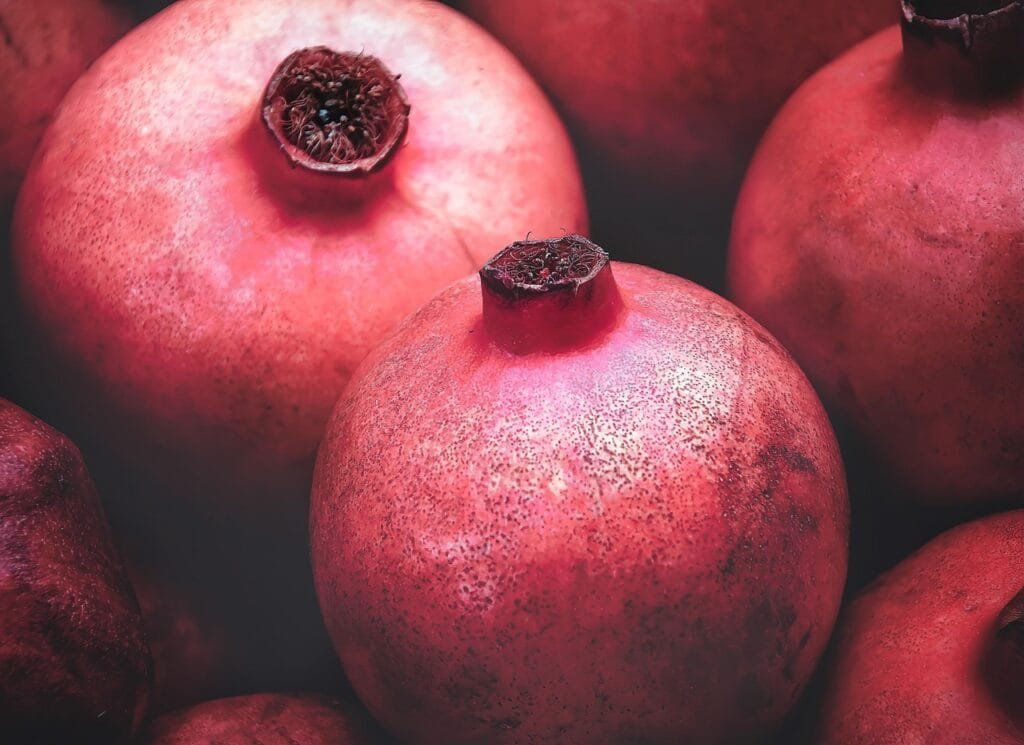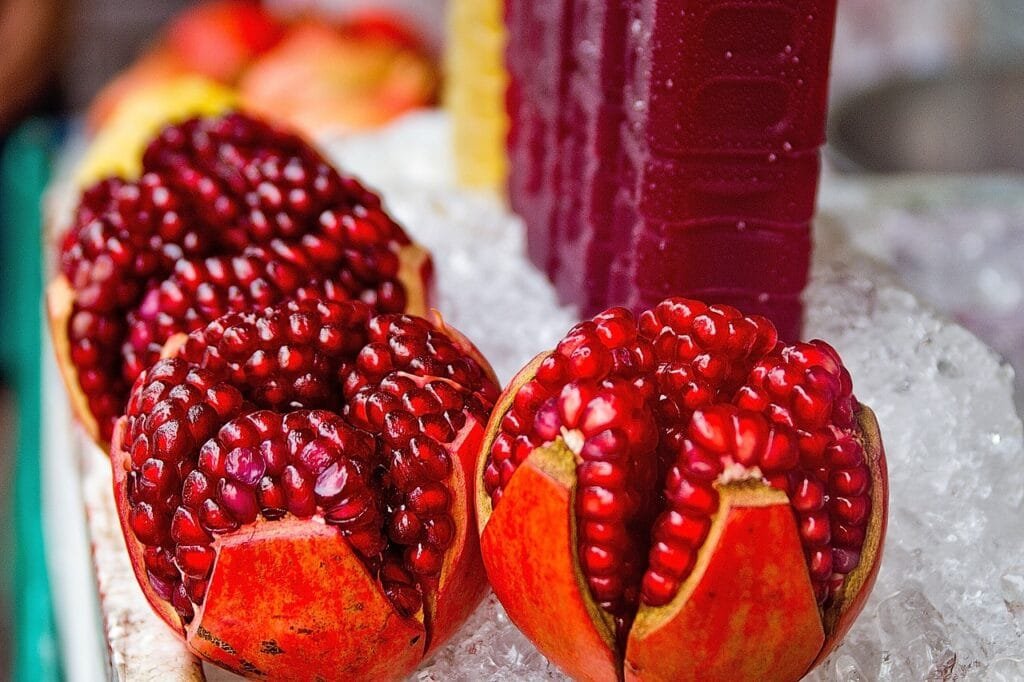Introduction

Pomegranate, botanically Punica granatum, has been an attractive fruit to most cultures for centuries due to its amazing exterior appearance and succulent seeds. Overall, it is indeed a treasure of nutritious and bioactive compounds, thus an excellent addition to a healthy diet. Here, we are looking at its nutritional profile, benefits to the skin, caloric and sugar content, and potential drawbacks.
Nutritional Profile of Pomegranate
Pomegranates are rich in essential vitamins, minerals, and antioxidants. A serving size of pomegranates would be about 100 g, equivalent to approximately ½ cup of arils. The given nutrients are as follows:
Calories: 83
Protein: 1.7 grams
Carbohydrates: 18.7 grams
Sugar: 13.7 grams
Dietary Fiber: 4 grams
Fat: 1.2 grams
Vitamin C: 10.2 mg (17% of the RDI)
Vitamin K: 16.4 mcg (21% of the RDI)
Folate: 38 mcg (10% of the RDI)
Potassium: 236 mg (7% of the RDI)
Pomegranates are also a good source of polyphenols that include punicalagins and anthocyanins, contributing to their potent antioxidant qualities.
Skin Benefits of Pomegranate
The bioactive compounds in pomegranates render incredible benefits in enhancing the skin.
Anti-Ageing Properties: Pomegranates are full of antioxidants that fight off free radicals, leading to an increase in skin aging. Regular consumption or topical application will improve skin elasticity, reduce wrinkles, and augment a glowing youthful glow.
Hydration and Nutrients: Pomegranate seed oil hydrates the skin. Hydration deep down enriches the moisture content of skin; hence, it is devoid of dryness.
Anti-acne Properties: The anti-inflammatory and antimicrobial properties of pomegranate fruit work as an antiacne agent and heal swollen skin. Sebum production can be balanced, decreasing the number of breakouts.
Skin regeneration: pomegranates stimulate keratinocyte proliferation, thus helping in the repair and regeneration of skin. Therefore, they are useful in healing scars and imparting even skin tone.
The presence of polyphenols in pomegranates protects the skin from UV rays. They are not sunscreens, but they give the skin an extra layer of protection against photoaging.
Calories and Sugar Content
This superfruit also contains natural sugars that make it moderately calorie dense. A 100-gram portion has about 83 calories and 13.7 grams of sugar, yet its fiber and antioxidant content slow the rush in blood sugar. This makes the fruit a healthier alternative than ready-made sugary snacks.
Pomegranates are safe for those who have diabetes or who are tracking their sugar; they can be enjoyed in moderation. Mixing it with protein and healthy fats stabilizes blood sugar spikes even further.
Side Effects

Even though pomegranates are known to be generally safe and beneficial for most people, it also has some possible side effects:
Allergic reactions. Although they are extremely rare, a few people have reported allergic reactions to pomegranates, and they can experience itching, swelling, or trouble breathing.
Interactions with Medications: Pomegranate may interact with particular medications, including blood thinners and cholesterol-lowering drugs. Consultation with a health care practitioner is always advisable before mass consumption.
Gastrointestinal Disturbance: Overconsumption of pomegranates results in digestive distress that may range from bloating or diarrhea due to their high fiber content.
High Sugar Content: Natural sugars present in the pomegranate are problematic for low-sugar or ketogenic diets. Moderation is extremely important.
The seeds contain some compounds that, to some, cause digestive problems. In such a case, they should opt for juice or seedless arils.
How to Incorporate Pomegranate into Your Die
a. You can include pomegranates in many ways in your diet.
b. Sprinkle arils into salads, yogurt, or oatmeal for added taste and nutrients.
c. Blend seeds into smoothies for a healthy drink.
d. Use pomegranate juice either in marinades or dressings or as an ingredient for fresh drinking.
e. Use pomegranate molasses with savory food to add a tart flavor.
Conclusion

Pomegranate is a nutrient-rich fruit that provides some health and skin benefits. The effective antioxidants assist in combating aging, further enhance the skin condition, and protect against chronic diseases in general. Pomegranate is high in natural sugars; it can be included in a balanced diet if consumed in moderation. Still, there are times when specific health conditions or special dietary needs may bring no benefit at all from this fruit, and one must consult a healthcare provider at such a time.
Add pomegranate to the daily diet and discover healthy enjoyment. Pomegranates are great fresh fruit, juice, or added to the contents of a meal, making the healthy habit of good health quite delightful.



